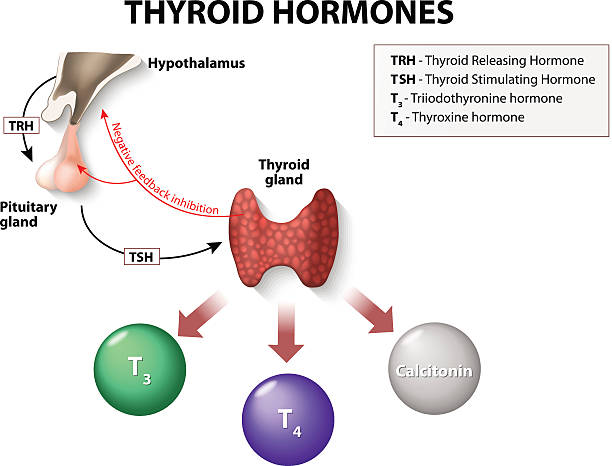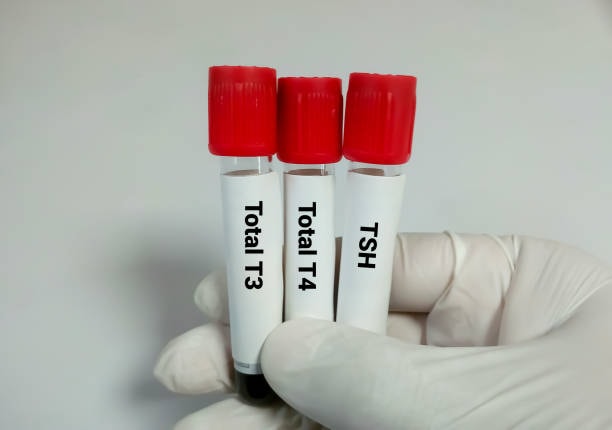
What Is T4? Thyroxine Test, Normal Ranges & What High Levels Mean
Time to read 8 min
Time to read 8 min
Table of contents
If you are someone who frequently experiences mood swings, fatigue for no reason, or sudden weight loss or gain, these may be signs of a thyroid problem, indicating abnormal thyroid hormone levels. Thyroid is a hormone that is produced by the thyroid gland, an endocrine gland located in the neck. Thyroid-stimulating hormone (TSH) is released into the bloodstream and transported to all tissues across the body. It allows the proper functioning of muscles, heart, brain, and other body organs helping the body utilize energy properly.
T4 or Thyroxine, which is often used in thyroid hormone replacement, is the main thyroid hormone formed by the thyroid gland. The small butterfly-like gland is placed in the front of the windpipe and is evaluated through the t4 thyroxine test. It produces thyroid hormone mainly in 2 forms, T3 (Triiodothyronine) and T4 (Thyroxine), which help regulate metabolism, heart rate, bowel function, menstrual cycle, and many other functions.
T4 is the prime thyroid hormone that exists in approximately 96% of the blood. T4 is transformed into T3 to employ its effects, that directly influence cellular metabolism. Thyroxine plays a vital role in the metabolism and complete health of an individual. T4 is prominently involved in brain development, heart function, muscle control, digestive processes, and bone maintenance.
T4 is crucial for normalizing metabolic rate, at what speed your body converts the food into energy. It affects heart rate, allowing proper oxygen delivery and blood circulation. T4 helps normalize digestive processes, allowing better nutrient absorption. It helps maintain muscle strength and coordination, bone density, and brain development.
T4 test examines the amount of bound and free thyroxine hormone in the blood, whereas FT4 assesses the amount of free thyroid hormone that can freely enter and impact body tissues. So, in simple words, T4 and FT4, which are essential components of thyroid function tests, both evaluate the Thyroxine level in the body, but in different forms. T4 measures the complete amount of T4, including the free or unbound portion and the portion bound to proteins. On the other hand, Free T4 measures only the unbound or free portion of thyroid hormone. FT4 indicates thyroid function more precisely as it imitates the biologically active form of the T4 hormone.
The thyroxine test evaluates T4 levels in your blood sample, as too little or too much T4 can signify a thyroid problem. FT4 is the biologically active form of Thyroxine that can enter body tissues as it needs it. Bound T4 or Thyroxine is attached to certain proteins, preventing it from entering body tissues, which is important to understand when considering thyroid medication . T4 levels are measured through FreeT4 or T4 tests.
Generally, the T4 blood test is recommended with other thyroid tests to diagnose thyroid disease and monitor thyroid treatment. It offers a better picture of medical issues that may affect your thyroid levels. T4 test can help detect:
Hypothyroidism: Underactive thyroid or hypothyroidism occurs when your thyroid gland is unable to produce a sufficient amount of thyroid hormone to meet your bodily requirements, unlike conditions where there is too much thyroid hormone produced .
Hyperthyroidism: Overactive thyroid or hyperthyroidism occurs when your thyroid gland produces an excessive amount of thyroid hormone than your body requires.
Other Thyroid-Associated Conditions: It can help detect thyroid nodules (non-cancerous growths on the thyroid gland) or an enlarged thyroid, making your neck look swollen (goiter). These conditions can be associated with high T4.
Pituitary Gland Associated Disorders: Usually, abnormal T4 is associated with thyroid issues; however, it may also be a sign of a pituitary gland-related problem that causes excessive or too little thyroid-stimulating hormone.
Moreover, healthcare providers may recommend a T4 test to know more about hypothalamic-related disorders or detect a newborn baby for congenital hypothyroidism that is present at birth.
Your doctor may ask you to take a T4 test if you have thyroid symptoms, as part of a routine health check-up, or in case of abnormal TSH (thyroid-stimulating hormone) test results.
Your healthcare provider may advise a T4 test if you have symptoms of hypothyroidism, such as, before having blood drawn for testing.
A healthcare professional may prescribe a T4 test if you are experiencing symptoms of hyperthyroidism, including:
Additionally, you should get tested for thyroid if anyone has a thyroid disorder in your family history. If you are taking thyroid medicine for hypothyroidism, a T4 test can help track the progress of treatment.
Typically, the normal T4 range ranges between 5.0 to 12.0 mcg/dL, and Free T4 ranges between 0.8 to 1.8 ng/dL. These values may slightly differ depending on certain factors.
Normal T4 value may differ slightly among various laboratories. Make sure you go through the reference range mentioned on your test results provided by the laboratory. Talk to your healthcare professional if you have any confusion regarding the normal value of your results.
Elevated T4 is a common sign of hyperthyroidism that often indicates too much thyroid hormone, caused by overactive thyroid nodules, Graves’ disease, thyroiditis (thyroid inflammation), excessive intake of thyroid hormone, and excessive iodine intake.
Thyrotoxicosis (hyperthyroidism) boosts metabolism that can be harmful to health, and its symptoms include:
If you notice symptoms of thyrotoxicosis, talk to your healthcare provider. Other factors that may elevate T4 levels include estrogen-containing birth control pills and pregnancy. Both situations involve high estrogen levels that increase protein bound to T4, leading to high T4. Certain medications, such as Amiodarone and PD-1 inhibitors, and certain iodine-containing products may also meddle with the production and conversion of thyroid hormone, contributing to high T4 levels.
Usually, low T4 indicates hypothyroidism or an underactive thyroid. It can be caused by a lack of iodine, certain autoimmune diseases (Hashimoto's disease), and certain medications. An underactive thyroid slows down metabolism, indicating that the body does not have enough thyroid hormone and the symptoms include:
Thyroid hormone production is regulated by a combined activity of TSH, T3, and T4 through a feedback loop. The pituitary gland produces TSH, which stimulates the thyroid gland to release T3 and T4. High T3 and T4 levels inhibit the production of TSH, while low T3 and T4 levels allow more TSH production from the pituitary gland. The process ensures healthy levels of thyroid hormone in the body.
Thyroxine (T4) testing is crucial during pregnancy, especially if you have any thyroid problems or a family history of thyroid disease.
Pregnancy: Get tested for T4 right after the pregnancy is confirmed, particularly if you have a history or family history of thyroid diseases.
Thyroid symptoms: If you have symptoms of thyroid issues, such as sudden weight gain or loss, fatigue, or irregular menstrual cycle, it's also essential to rule out thyroid cancer.
Family history of thyroid: Your doctor may recommend a T4 test if you have a family history of hypothyroidism or other thyroid disease.
Treatment progress: If you are taking medication for hypothyroidism, including thyroid hormone replacement therapy T4 levels should be regularly monitored to track the progress and modify dosage if required.
Generally, no special preparations are required for the T4 test, which carries very little risk . Your doctor may advise you to stop certain supplements or medications depending on the purpose of the T4 test. For instance, you should not take biotin supplements 3-5 days before a T4 or FT4 blood test.
The thyroid is an essential gland that should be checked regularly, particularly if you have a family history of thyroid-related problems. T4 is the main hormone, thus abnormal and unchecked thyroid hormones can cause various health issues. Certain factors can interfere with T4 test results, such as pregnancy, severe illness, and certain medications. In case of abnormal results T4 results, your healthcare provider may recommend follow-up tests such as the T3 test, TSH test for precise diagnosis.
T4 laboratory test stands for the thyroxine test, which is essential for assessing thyroid health. T4 hormone is produced by the thyroid gland, which has a vital role in metabolism.
Normal T4 level in females (non-pregnant) ranges between 4.5 to 11.5 mcg/dL, and FT4 normal range ranges between 0.8 to 1.9 ng/dL. It may slightly differ in different laboratories.
Sometimes, high T4 levels can be temporary due to thyroiditis, thyroid inflammation that produces excessive thyroid hormone, which can be confirmed through a blood sample.
T4 levels can be affected by several factors such as thyroid conditions, pregnancy, certain medications, and medical conditions.
***Medical Disclaimer: All the information provided here is for educational purposes only. Any information mentioned on this website, including text, images, and graphics, is not intended as a substitute for professional medical advice. Kindly visit your healthcare provider concerning your particular health condition(s).
